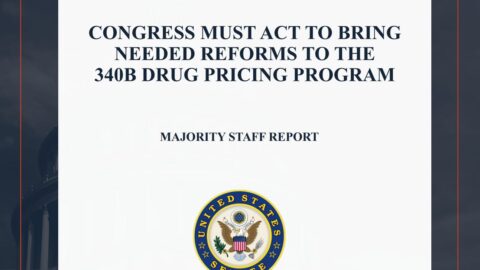The idea that hospitals are marking up prices on medicines — not by a little, but by a whole lot — is not a new one. PhRMA has been waving its arms around the topic since at least 2018, and their most recent revisitation of the topic, last year, found that markups are still a scourge.
So it’s not necessarily surprising to see this New England Journal of Medicine publication that affirms that hospitals are marking up the medicines they administer. And they’re not imposing 10% or 20% markups. We’re talking about charging insurance companies triple — or more — what it costs them to acquire cancer or inflammatory disease medicines.
The NEJM piece also details how 340B hospitals can drive even higher profits, by not only seeking super-high reimbursement from insurance companies but also by grabbing discounted 340B rates, too. All in all, 340B hospitals end making twice as much money as drug companies for every medicine dispensed.
All of this points to a need to seriously reform the 340B program, a point that was made incredibly clearly in this MedPage Today coverage of the paper. Lead author James Robinson from the University of California Berkeley told the outlet: “The 340B [program] is not working as intended.”
Michael Barnett, from Harvard’s T. H. Chan School of Public Health, who wasn’t involved in the study, was even more direct. “This analysis shows that a government program meant to provide incentives to serve lower income Americans is actually a cash cow for hospitals with little accountability for whether that extra profit is allocated towards the population 340B is intended to serve.”
Yowza.
(BTW: This was an Arnold Ventures-funded study. Make of that what you will.)
A close friend of the Curve received an interesting email earlier this month from Optum with quite the pitch: “When patient deductibles reset, your business as usual gets disrupted. Optum Bank can help. …”
I had no idea that Optum had a bank, but I guess I shouldn’t be surprised. It’s a very Optum-like approach: take providers who have cash-flow problems caused by the benefit design of Optum’s parent company (UnitedHealthcare) and offer them loans to ride out those bumps. Presumably, United profits from higher deductibles and delayed provider reimbursement, and then they have a second chance to profit with loans (provided for a fee, natch) from providers waiting for reimbursement.
It’s one hell of a racket.
Optum Bank has kept a low profile, but it’s not a new entity. Last summer, STAT’s Bob Herman tracked the growth of Optum Bank (which — in addition to the ever-so-helpful loans to providers — also profits from health savings accounts), which generates about $300 million a year in profit. Not shabby!
This LinkedIn piece is even more fun, calling Optum a “gangster bank” and giving some background on the provider loan service, which apparently launched last spring.
I have yet to lose my sense of wonder — or my feeling of nausea — at the creative ways that different elements of the system have devised to benefit from the chaos that is American health care.
The 10 medicines up for price controls under the IRA will get initial bids from CMS next Thursday. Endpoints said that the drugmakers will keep mum, STAT quoted Gerry Anderson from Hopkins saying he expects the prices to leak. I’ll put my money on this all staying secret, but that doesn’t mean that Feb. 1 isn’t still an important communications milestone. CMS’ opening offer is likely to influence how different companies frame the program, even if they’re not going to make the process itself public.
By my count, the FTC has successfully taken the pharmaceutical industry to task once in the past year, derailing what should have been an uncontroversial takeout of Maze by Sanofi. The agency’s effort to blow up the Amgen-Horizon deal went nowhere, and it’s not clear where the saber-rattling around Orange Book patents is going. That makes the headline of this STAT story — sources to FTC officially — kind of weird: “When it comes to policing pharma, the FTC says it’s on ‘an incredible winning streak.’” Maybe the FTC has a different definition of “streak.” Or “winning.”
This WaPo story about the Orange Book stuff is also weird, in that it mostly just provides background without any meaningful perspective on where we are right now. I read it like three times to figure out if there was a hidden nugget of news but came up empty.
STAT’s informal whip count suggests that Bernie Sanders might have enough support to subpoena pharma CEOs to testify before his committee, a tactic that hasn’t been used in decades. But it feels like pharma has done an OK job here of shifting the narrative, and that’s a win in itself. (To be clear, pharma will still be painted as the villain, no matter where things go from here. But there is now a counternarrative floating around that suggests this is Bernie grinding an axe.)
If this email was forwarded to you, and you’d like to become a reader, click here to see back issues of Cost Curve and subscribe to the newsletter.





